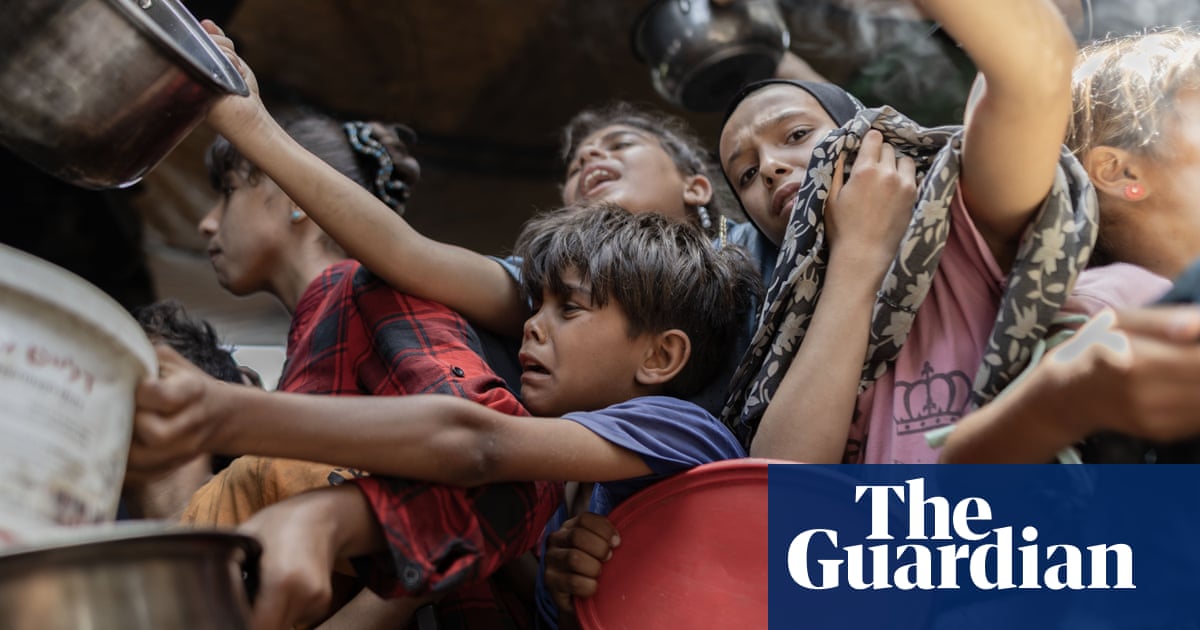Two days afterBenjamin Netanyahuannounced he was lifting the siege of Gaza, Israel is still blocking food from reaching starving Palestinians, the UN has said, as the leader of the country’s centre-left Democrats party said his country was becoming a pariah nation that “kills babies as a hobby”.
Only five trucks of aid had reachedGazaby Tuesday afternoon and aid workers had not been given permission to distribute even that token shipment, Jens Laerke, spokesperson for the UN humanitarian office (Ocha) told a Geneva press briefing.
Israeli authorities have approved “around 100” other trucks to enter Gaza but not yet let them cross, he said. Even that shipment would do little to reduce widespread hunger after 11 weeks of near total siege; it is just a fifth of what reached Gaza daily before the war, when people were well-fed.
Israeli officials responsible for aid distribution in Gaza said 93 trucks had entered Gaza on Tuesday but did not respond to questions about whether the food and medicines they carried had been authorised for distribution.
Looming famine in the territory has provoked international outrageand heavy diplomatic pressure on Israel’s prime minister to allow food to reach more than 2 million people trapped in Gaza.
On Sunday night Netanyahu announced he was ending the siege on Gaza because a “starvation crisis” would damage his country’s global standing.
Yair Golan, the leader of the opposition Democrats who served as deputy chief of staff for Israel’s military before entering politics, said that after an unjustifiably brutal campaign, much of the damage had already been done.
Netanyahu’s government was making the country as isolated as apartheid-era South Africa, he told Reshet Bet radio.
“A sane country doesn’t engage in fighting against civilians, doesn’t kill babies as a hobby and doesn’t set the expulsion of a population as a goal,” he said.
Netanyahu attacked Golan’s comments as “contemptible antisemitic blood libels against IDF soldiers and the state of Israel”, but Golan later doubled down on his position in a press conference.
Israel’s war in Gaza begun as a just campaign, he said, after Hamas killed about 1,200 people and kidnapped 250, in cross-border attacks on 7 October 2023, but had become a corrupt war. The left had been too frightened to speak out and should condemn what was happening more vocally, he added.
For most of the war, opposition to Netanyahu among Jewish Israelis has focused on the failure to bring back hostages or the conduct of the campaign, rather than the deaths of Palestinians in Gaza, or the hunger and destruction there.
The few who have focused on Palestinian suffering have faced harsh policing under the far-right security minister, Itamar Ben-Gvir.
On Monday police arrested anti-war activists who went to protest near the Gaza border holding images of Palestinian children killed in Israeli airstrikes, detaining them overnight before releasing them to house arrest. They included Alon-Lee Green, co-director of Palestinian-Israeli campaign groupStanding Together.
“While peaceful demonstrators are dragged before the courts, rightwing extremist settlers are allowed to enter Gaza illegally,carry out attacks on Palestinians in the West Bankand hold settlement conferences on the Gaza border with full impunity, revealing a dangerous double standard in the state’s use of force,” Standing Together said in a statement.
Inside Gaza, Israel’s intensifying ground and air campaign added to the misery caused by widespread hunger.
Israeli strikes on Tuesday killed at least 85 people, including attacks on a family home and a school used as a shelter in northern Gaza that killed at least 22 people, more than half of them women and children, Gaza’s health ministry said.
Israel earlier in the week issued evacuation orders for all of central Khan Younis, the second largest city in the Strip, declaring it a “combat zone”, and ordering its exhausted and hungry inhabitants to displace themselves again.
Most people in the Strip have moved repeatedly in attempts to escape Israeli airstrikes, though no part of Gaza has been spared attacks.
The death toll from Israeli attacks has now passed 53,000, more than half of them civilians. There are more than 28,000 women and children among the dead, UN Women said this week.
